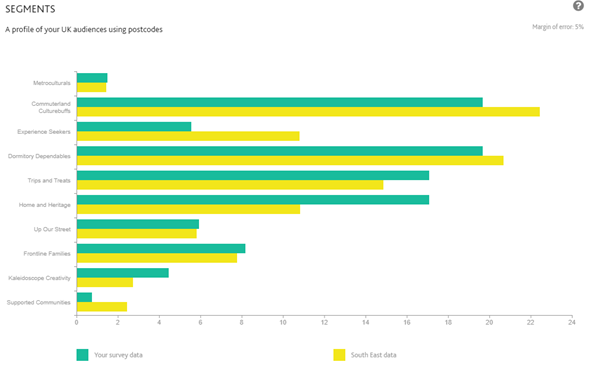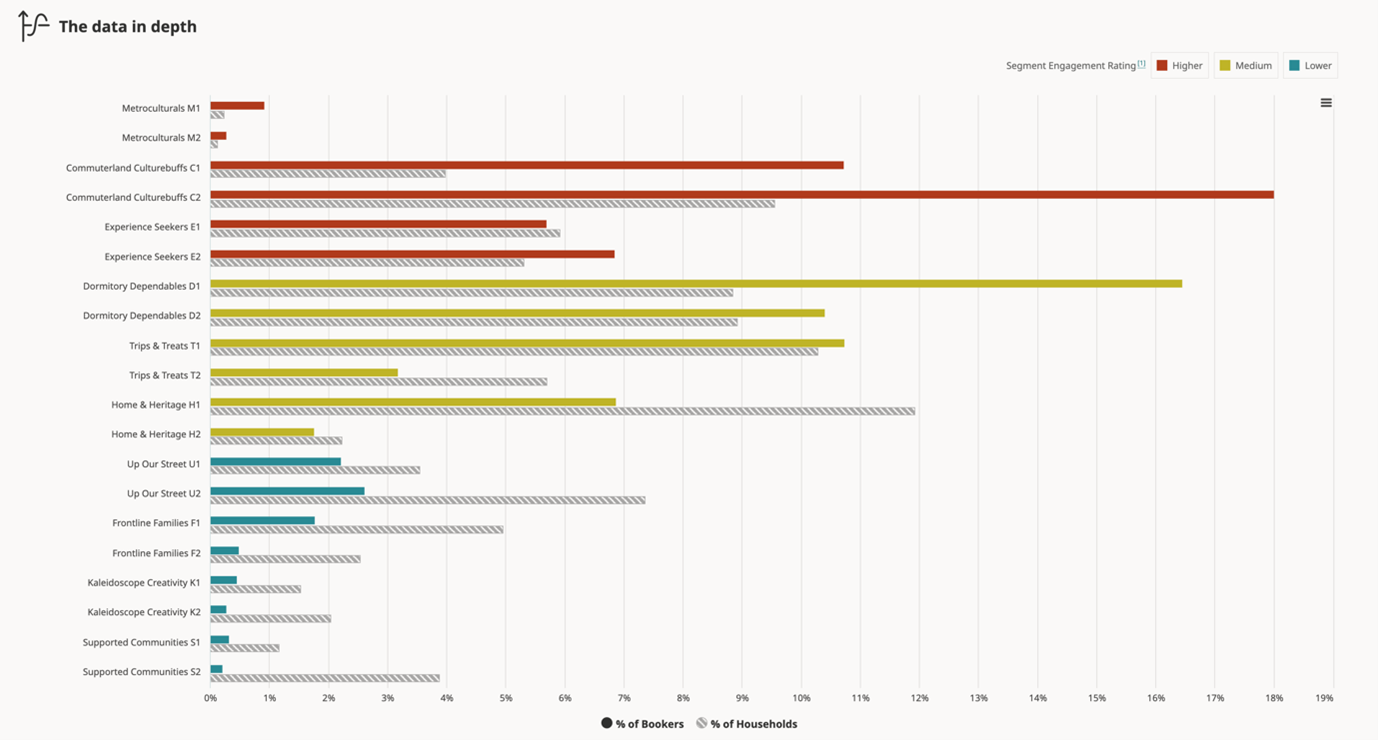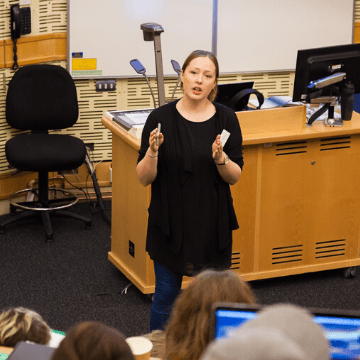Identify the segments you aren't reaching in order to grow engagement with them.
Rosanna Cant
Head of Networks
We often talk about audience development in terms of the ‘low hanging fruit’ of growing warm/already engaged audiences, such as your core segments. However, to neglect the fruit higher up – i.e. those audiences you could be reaching but aren’t currently – is a big mistake.
This is exactly the kind of challenge that the Audience Spectrum Subsegments can help to address. Combining these with other insights from Audience Finder Data Tools can unearth some great ways of getting to know your lesser served audiences and figuring out how to reach them. For those not contributing data, this is also available in a report format.
- Step 1: Deep dive into your core audience data. In the Audience Finder Answers and Audience Finder Original dashboards, you can view graphs of your ticketing and/or survey data that show your Audience Segment profiles in relation to a chosen benchmark. If you choose a population benchmark (such as the region you are based in), you can gain an understanding of who you are reaching/overreaching and, crucially, under-reaching. For example, this graph at core segment level demonstrates that this organisation has a strong representation of Commuterland Culturebuffs and Dormitory Dependables in their audience data which is in line with the regional benchmark. They also have an almost as strong representation of both Trips and Treats and Home and Heritage, which is significantly higher than the regional benchmark. And then we can clearly see that there is an opportunity to reach more Experience Seekers than they are currently engaged with as this is an underserved segment against the population data.

- Step 2: Identify new target segments: The below graph shows a similar example at Audience Spectrum Subsegment level, against the organisation's catchment area from within Audience Finder Answers. The next step would be to then identify the aspects of the Spectrum Profiles that would be useful in developing a relationship with the underserved segment. One aspect of this could be considering what partnership work you could do with other organisations to reach that segment – is it a segment that prioritises gardening? DIY? Going to the gym? The segment profiles should provide the information for you to build a plan to partner with other organisations to reach your chosen segment – either through partnership offers/marketing or outreach community work.

- Step 3: Get geo-specific: To make this work even more geo-specific, you could also use the Mapping Tool in Audience Finder Original and search for the “warmest” areas of your chosen segment and then find the partners to work with within that area. This could be using the mapping Tool to find the postcode with the highest % of Up Our Street and then (knowing that this is applicable to the profile of this segment) searching for the Social Clubs in that postcode area, for example.
------------------------------------------------------------------------------------------------------------------------------------
Here are a few other examples based on the core segments in the above example to give you some ideas:
- Engaging more E1 | Experience Seekers through running an offer with a local specialised restaurant.
- Working with the local shopping centre to run a Pop Up Museum exhibition encouraging engagement with T1 | Trips and Treats.
- Partnership working with other neighbouring cultural organisations to offer a family passport-style scheme to collect stamps at free events across the city, targeting F2 | Frontline Families.
Related Guides
- Boost Your Email Marketing with Audience Spectrum - a step by step guide
- How to use Audience Spectrum to Enhance your Funding Applications
- How to Use Audience Spectrum to Inform Your Programme and Engage with Diverse Audiences
- How to use Audience Spectrum to Target Paid Online Advertising
- How to use the Audience Spectrum Segments in your Catchment Area chart on your Overview Dashboard
- Segmentation made simple
- Using Audience Spectrum Subsegments | Speak your benefactors' language
- Using Audience Spectrum Subsegments | Upsell your add-ons more effectively
- Top Tips | Using the Audience Spectrum Subsegments
- Using Audience Spectrum Subsegments | Get personal with your profiling
- How understanding audience segmentation can inform your website user experience
- Explanation: Mosaic
- What is the Audience Spectrum Enhancement in Spektrix, and how does it work?
- How to get started with applying Audience Spectrum attributes to your Spektrix reports
- Using Audience Spectrum strategically as a customer attribute in Spektrix
- Creating and improving dynamic content in Spektrix using Audience Spectrum
Related Questions
- How do I get set up with the Audience Spectrum Enhancement for Spektrix?
- I have an Audience Spectrum license: why are some of my customer records profiled as ‘Unclassified’ & ‘Unmatched.’
Case Studies
-
 Audience Spectrum in Action | Securing Funding for a Circus Festival
Audience Spectrum in Action | Securing Funding for a Circus Festival
-
 Audience Spectrum in Action | Aberdeen Performing Arts
Audience Spectrum in Action | Aberdeen Performing Arts
-
 Audience Spectrum in Action | London & Culture Calling Arts
Audience Spectrum in Action | London & Culture Calling Arts
-
 Audience Spectrum in Action | Theatr Brycheiniog
Audience Spectrum in Action | Theatr Brycheiniog
-
 How Audience Spectrum helped support Nottingham Playhouse's Levelling Up Strategy
How Audience Spectrum helped support Nottingham Playhouse's Levelling Up Strategy
-
 Looking ahead at Hall for Cornwall
Looking ahead at Hall for Cornwall
-
 Using Audience Spectrum to drive culture change and a major audience development programme
Using Audience Spectrum to drive culture change and a major audience development programme
-
 Audience Spectrum in Action | Edinburgh International Festival
Audience Spectrum in Action | Edinburgh International Festival
-
 Shakespeare North Playhouse: Audience development using Audience Spectrum as a catalyst and tool
Shakespeare North Playhouse: Audience development using Audience Spectrum as a catalyst and tool

